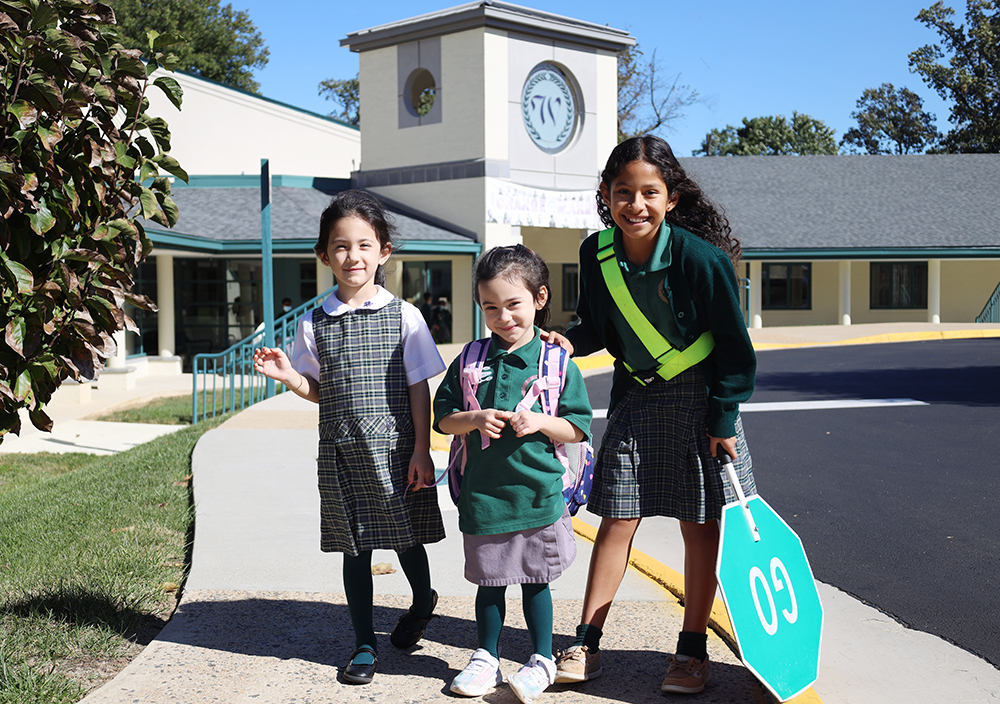Service Learning has a significant impact on Students and their Community
The National Youth Leadership Council defines service learning as an “approach to teaching and learning in which students use academic and civic knowledge and skills to address genuine community needs.” Service learning combines academic learning with community problem-solving. It is valuable to a student’s education because it teaches the whole student—character and mind. Integrating service learning into academics through experiential learning provides a meaningful and impactful education.
Service learning enables students to see the curriculum in practice and value what they learn tangibly. It encourages interpersonal reflection and prosocial behavior and allows students to broaden their understanding of the curriculum, their community, and themselves.
Service learning is a civic responsibility. Students contribute to their community through active participation. A significant benefit is that students don’t merely watch or read about how to serve their community; they actively participate.
Types of Service Learning
There are two main types of service: indirect and direct. Indirect service learning focuses on advocacy, including organizing a fundraising event, sponsoring food/clothing drives, conducting environmental studies, or writing letters to government officials.
The more common type, direct service learning, focuses on actionable service to individuals. Through direct service learning, students are in immediate contact with those they are helping.
Examples of direct service learning include:
- Tutoring,
- Serving meals,
- Helping in a nursing home,
- Cleaning up a community (physical labor, picking up trash, etc.), or
- Building projects.
Benefits of Service Learning
There are many benefits of service learning. It connects learning to real-world scenarios and allows students to be active and influential community members. Service learning at a young age teaches children practical life skills and builds character. It will enable students to grow in personal reflection and show compassion for others.
Service learning strengthens a student’s personal and professional interests. Students connect with groups and people in the community, setting them up for future job opportunities.
Other benefits of service learning include:
- Reducing discipline problems,
- Improving classroom/school climate,
- Enabling students to become community members, and
- Working alongside peers, adults, and other community members.
Components of Service Learning
Service learning involves careful planning. It is not walking around with hopes of doing good.Careful planning makes the impact on the community and the student greater.
Additionally, service learning involves active participation and reflection for students. Students aren’t simply reading or talking about these topics – they’re actively engaged in doing something with the knowledge learned in the classroom. Experiential learning is a large component and benefit of service learning.
Another essential part of service learning is reflection. Reflection teaches students to become intentional and thoughtful learners. Social and emotional learning (SEL) happens alongside service learning. SEL and service learning encourage students to reflect on and evaluate their efforts, not just in a way that benefits them but in a way that serves their community.
Impact of Service Learning
Service learning affects not just a student but also his/her community. The goal of service learning is to create a positive and impactful outcome. This outcome can occur on the day of service and years later for the student, his/her education, and the community.
The impact of service learning on students and their education includes:
- A better understanding of what it means to be a responsible citizen.
- Preparing students for the job market and their future.
- Exposure and appreciation of diversity.
- A better understanding of the needs in their community.
- Leadership and teamwork skills.
The impact of service learning on a community can include:
- Growing collaborative relationships between students and community members, and
- Providing valuable services and meeting needs.
Westminster School gives students this impactful and experiential learning, valued as part of a collaborative approach to learning. Using an integrated curriculum, Westminster takes lessons from the classroom and focuses on empathy, civic responsibility, honor, and meaningful learning within the community.
Looking For a Private School in Fairfax County, Virginia, That Values Service Learning?
If serving the community is important to you and your family, learn more about what differentiates Westminster School from other private schools.
Westminster School’s emphasis on service learning allows students to give back to their community.
Contact us today with questions or to set up a school tour.


